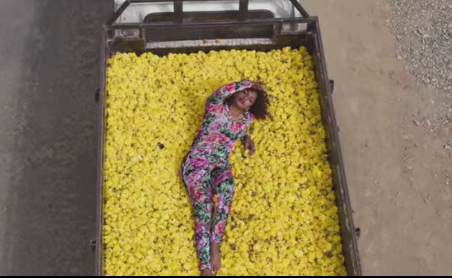Though M.I.A. only recently released her auditory masterpiece, AIM, whereupon she then swore off making music, the rapper/unofficial refugee spokesperson couldn’t seem to resist dropping a timely new single about, what else, power. Throwing shade in the eloquent and roundabout way that only M.I.A. can, she declares, “Throw up my hands/Say this is people power/Throw up my finger and I’m taking on the Tower.” We can safely assume this must, at least in some way, refer to Trump Tower.
In the accompanying self-directed video, M.I.A. leaves no visual expense spared, opening with her favorite symbol of freedom (also featured in the video for “Bad Girls”)–the car–though at first we assume she’s lying on some Bollywood-inspired bed of flowers that puts Beyonce’s pregnancy photo to shame, the overhead shot of her reveals a truck driving down the road in an abyssal, mountainous landscape.
From there, a group of OCD-level in their precision synchronized dancers put the common wave at a stadium to shame with their moves while M.I.A. asks, “Don’t you wanna tell me if you’re put down your armor?/Promise no more drama.” These days, however, it seems like the drama is just getting started. But M.I.A. warns, “I’ma do it now/I’ma show you how”–meaning, of course, she wants to lead the revolution of rebellion against all those politicians of a conservative and oppressive nature who have seemed to rise at the same point in time. Appropriately playing up perhaps one of the whitest musicals, Mary Poppins, M.I.A. quips “supa-kala fascist, racist, espi-ala-tazors” won’t be able to erase us.
Naturally, most listeners have chosen to focus on the presumed diss of M.I.A. insisting, “I’m not Rihanna/I’m not Madonna/I’m not Mariah, or Ariana” (who knew so many pop stars had such convenient to rhyme names?). And yet, it’s more likely that what she’s actually alluding to is the turning of her back on an archetype of mainstream beauty and artistry–the kind that tends to pander to established norms. Constantly paying homage to her Indian heritage while swathed in brightly colored sheer fabrics that billow in the wind as she walks through nature in assured confidence, M.I.A. has no intention of catering to anyone. It is eventually the concluding image of her clothing billowing in the wind that we’re left with.
For someone who has always been as politically charged as M.I.A., it is this moment in history that has presented her with the role that suits her most: musical orator with a beat that demands change. If “P.O.W.A” is any indication of all that M.I.A. still has left to say about humanity, there’s no way she can be permitted to retire now.



















